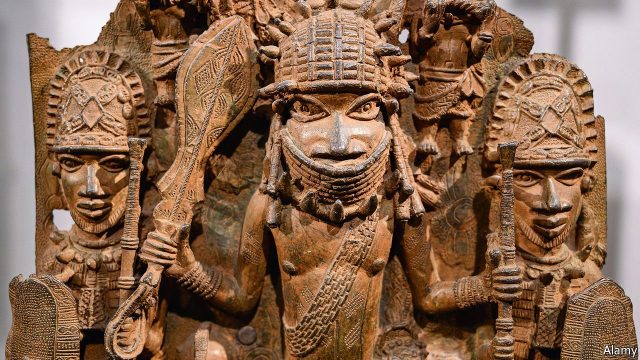What Are the Benin Bronzes?
The Benin Bronzes are a collection of sculptures and plaques made primarily from bronze, brass, and ivory, created by the Edo people of the Kingdom of Benin (in present-day southern Nigeria, not the Republic of Benin).
🔔 Note: The Kingdom of Benin was a powerful West African state centered around modern-day Benin City, Nigeria — not to be confused with the current Republic of Benin (formerly Dahomey).
🎨 Key Features of Benin Bronzes
- Intricate relief plaques depicting court life, warriors, nobility, and European visitors.
- Stunning metal casting techniques, especially the lost-wax (cire perdue) method.
- Ritual and symbolic importance, often used to decorate the royal palace or as historical records.
- Created as early as the 13th century, with most famous pieces dating from the 15th to 18th centuries.
📜 Historical Significance
- In 1897, during the British punitive expedition, thousands of these artworks were looted and taken to Europe.
- Today, the Benin Bronzes are housed in major museums worldwide, including the British Museum, the Louvre, and the Metropolitan Museum of Art.
- Ongoing restitution efforts are underway, with some countries beginning to return the bronzes to Nigeria.
What About the Republic of Benin?
While the Republic of Benin (neighboring Nigeria) is not the origin of the Benin Bronzes, it also has a rich artistic tradition, particularly in:
- Vodun (Voodoo) religious sculptures
- Traditional bronze casting in Abomey, the capital of the ancient Kingdom of Dahomey
- Royal bas-reliefs and appliqué textiles
✅ Summary
| Aspect | Kingdom of Benin (Nigeria) | Republic of Benin |
|---|---|---|
| Famous for | Benin Bronzes | Vodun art, Dahomey bas-reliefs |
| Capital | Benin City | Porto-Novo (official), Cotonou (economic) |
| Cultural focus | Royal court art, bronze casting | Traditional religion, kingship, textile art |
















